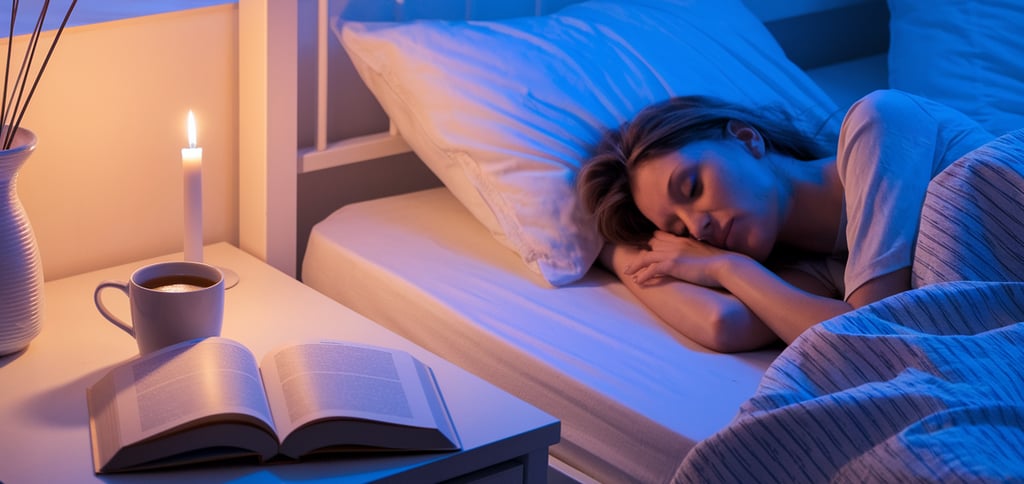Mastering Sleep Hygiene: 10 Tips for a Better Night’s Rest
We don’t get enough sleep anymore, and it’s making us miserable. Prioritizing rest is a form of self-love, and with a few simple shifts—like setting a calming bedtime routine, creating a cozy sleep sanctuary, and reducing blue light exposure—you can wake up refreshed and energized.


I used to think that running on just a few hours of sleep was a badge of honor—proof that I was productive, hardworking, and unstoppable. But the truth? I was exhausted, unfocused, and running on fumes. My mood was all over the place, my skin looked dull, and no amount of caffeine could make up for the fact that I wasn’t giving my body the rest it desperately needed. Sound familiar? If so, it's time for a sleep hygiene makeover.
Sleep is not a luxury—it’s a necessity. Research shows that about 33% of Americans don’t get enough sleep, and the effects can be brutal: brain fog, irritability, low energy, weakened immunity, and even increased risk of chronic diseases. But the good news? Better sleep is within reach. By adopting a few simple habits, you can create a sleep routine that leaves you feeling refreshed, energized, and ready to take on the world. Let’s dive into 10 powerful ways to master sleep hygiene and finally get the rest you deserve.
1. Create Your Ultimate Sleep Sanctuary
Your bedroom should be a haven of peace and relaxation. If your space is cluttered, uncomfortable, or filled with distractions, your sleep will suffer. Here’s how to turn your room into a sleep-friendly oasis:
Block out light. Invest in blackout curtains or wear a sleep mask to keep your space dark.
Cut out noise. A white noise machine, earplugs, or a fan can help drown out disruptive sounds.
Keep it cool. The ideal sleep temperature is between 60-67°F (15-19°C). Cooler temps help signal to your body that it’s time to rest.
Upgrade your bedding. A comfortable mattress and pillows that support your sleep style make all the difference.
Your bedroom should whisper relaxation. Think cozy blankets, soft lighting, and a touch of lavender to set the perfect sleep scene.
2. Stick to a Consistent Sleep Schedule
Our bodies crave routine. Going to bed and waking up at the same time each day (yes, even on weekends) helps regulate your internal clock, making it easier to fall asleep and wake up feeling refreshed.
If you’re currently all over the place with your sleep schedule, start by adjusting it in 15- to 30-minute increments until you reach your desired bedtime and wake-up time. Small shifts make it easier for your body to adapt without feeling like a shock to your system.
3. Power Down Before Bed
We’ve all been guilty of late-night scrolling, but screens are one of the biggest sleep disruptors. The blue light emitted from phones, tablets, and TVs messes with your melatonin levels (the hormone that helps you sleep). Try this instead:
Shut off screens at least 1 hour before bed.
Use blue light filters on your devices if you must use them.
Swap screen time for a relaxing ritual, like reading a book, journaling, or stretching.
Less screen time = deeper, more restful sleep.
4. Establish a Wind-Down Routine
Think of a bedtime routine as your personal invitation to sleep. It signals to your body that it’s time to relax and unwind. Try incorporating some of these calming activities:
A warm bath or shower
Light stretching or yoga
Deep breathing exercises or meditation
Drinking a soothing cup of caffeine-free tea (like chamomile or peppermint)
Your nighttime ritual should feel like an act of self-care, not a chore.
5. Be Mindful of Your Diet
What you eat and drink directly affects your sleep. Heavy meals, spicy foods, and excess sugar before bed can cause indigestion and restless sleep. Instead, try these tips:
Avoid caffeine and alcohol in the hours leading up to bedtime.
Opt for light, sleep-friendly snacks like bananas, almonds, or a small bowl of oatmeal.
Stay hydrated, but limit liquids right before bed to prevent middle-of-the-night bathroom trips.
6. Move Your Body (But at the Right Time)
Exercise is incredible for sleep, but the timing matters. Regular physical activity helps you fall asleep faster and enjoy deeper rest. However, intense workouts too close to bedtime can be too stimulating.
Morning and afternoon workouts are best for promoting restful sleep.
If you must exercise in the evening, opt for gentle yoga or stretching instead of high-intensity workouts.
7. Manage Stress and Anxiety
If your mind won’t stop racing at night, stress might be the culprit. Chronic stress and anxiety can make it impossible to relax and drift off. To calm your mind:
Write down your thoughts in a journal before bed.
Practice mindfulness or meditation to quiet your inner dialogue.
Try guided sleep meditations or calming music to help lull you into sleep.
8. Optimize Your Bedroom Lighting
Light plays a huge role in regulating sleep.
During the day, expose yourself to natural light to help keep your circadian rhythm on track.
In the evening, dim the lights to signal to your body that it’s time to wind down.
If you wake up in the middle of the night, use a dim red nightlight instead of bright overhead lights to avoid disrupting melatonin production.
9. Don’t Force Sleep
Ever find yourself staring at the ceiling, frustrated that you can’t sleep? The more you stress about it, the harder it becomes.
If you’re struggling to fall asleep:
Get up and do something relaxing (like reading or listening to calm music) until you feel drowsy.
Avoid checking the clock—watching the minutes tick by only creates more anxiety.
Remind yourself that rest is still beneficial even if you’re not asleep yet.
10. Give Yourself Grace
Improving your sleep hygiene isn’t about perfection—it’s about progress. Some nights will be better than others, and that’s okay. Be patient with yourself as you build healthier habits.
If you struggle with sleep regularly, listen to your body. It might be time to check in with a healthcare professional to rule out any underlying issues.
Sleep Better, Live Better
Prioritizing your sleep hygiene isn’t just about getting more rest—it’s about improving every aspect of your life. Better sleep means better focus, more energy, improved mood, and a stronger immune system.
So tonight, give yourself permission to rest. Your body, mind, and soul deserve it. Sweet dreams!
